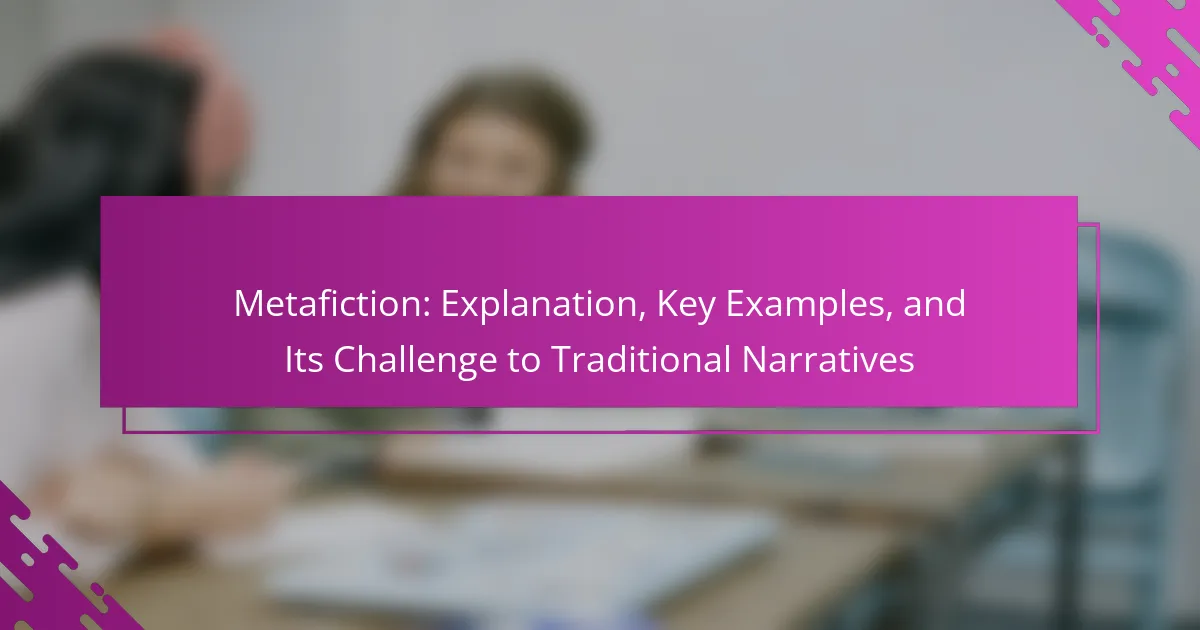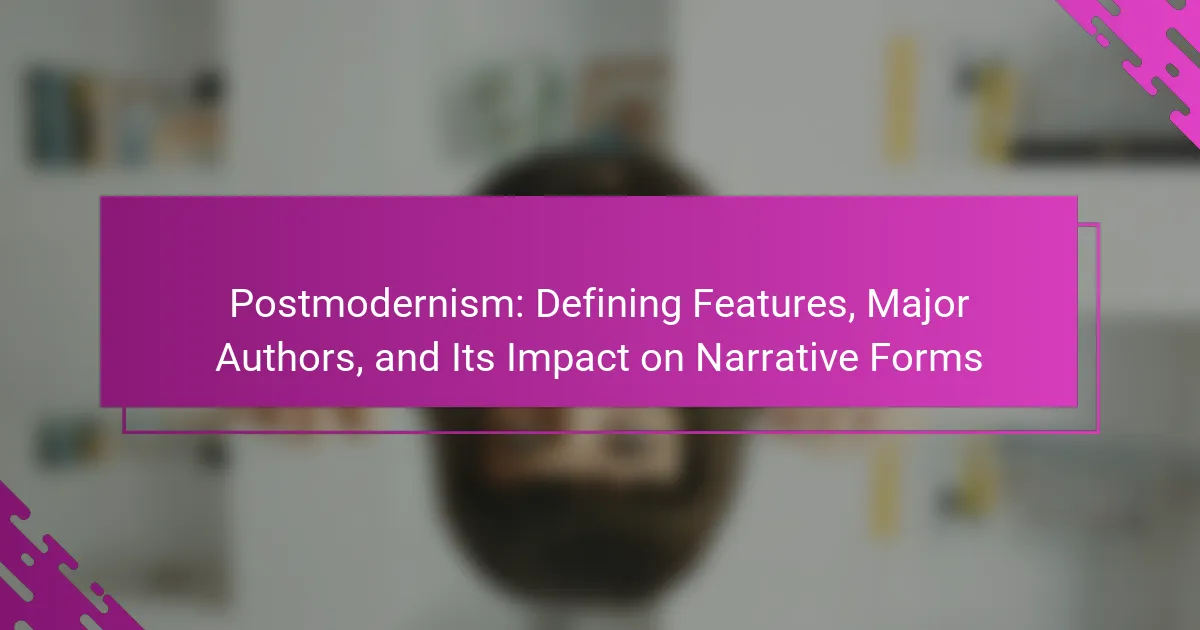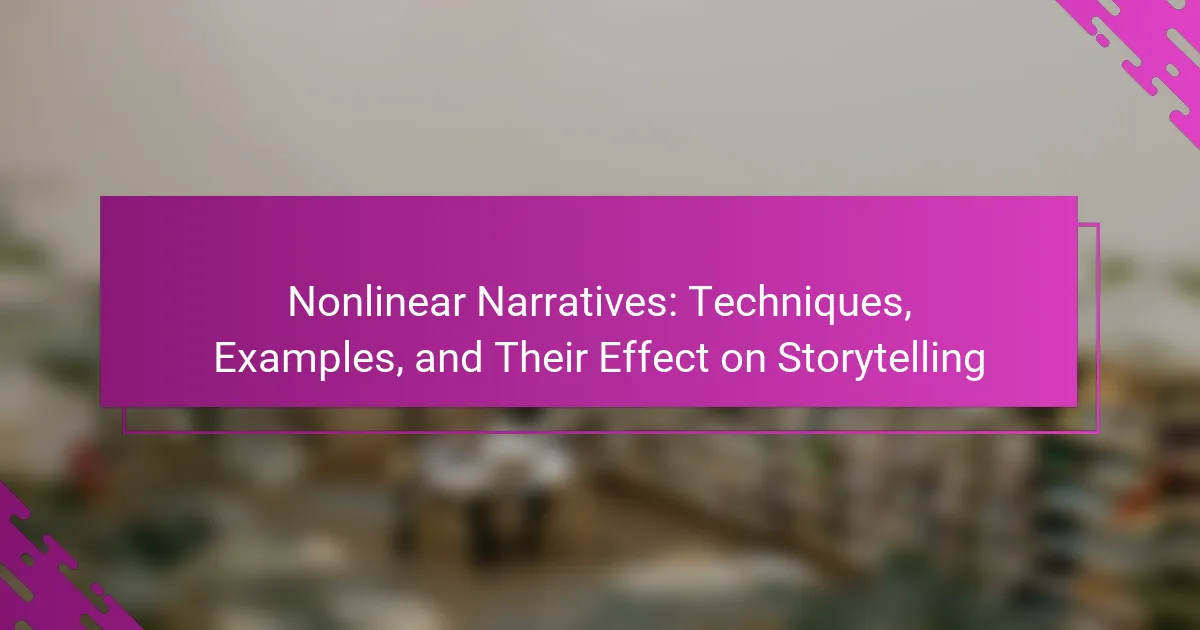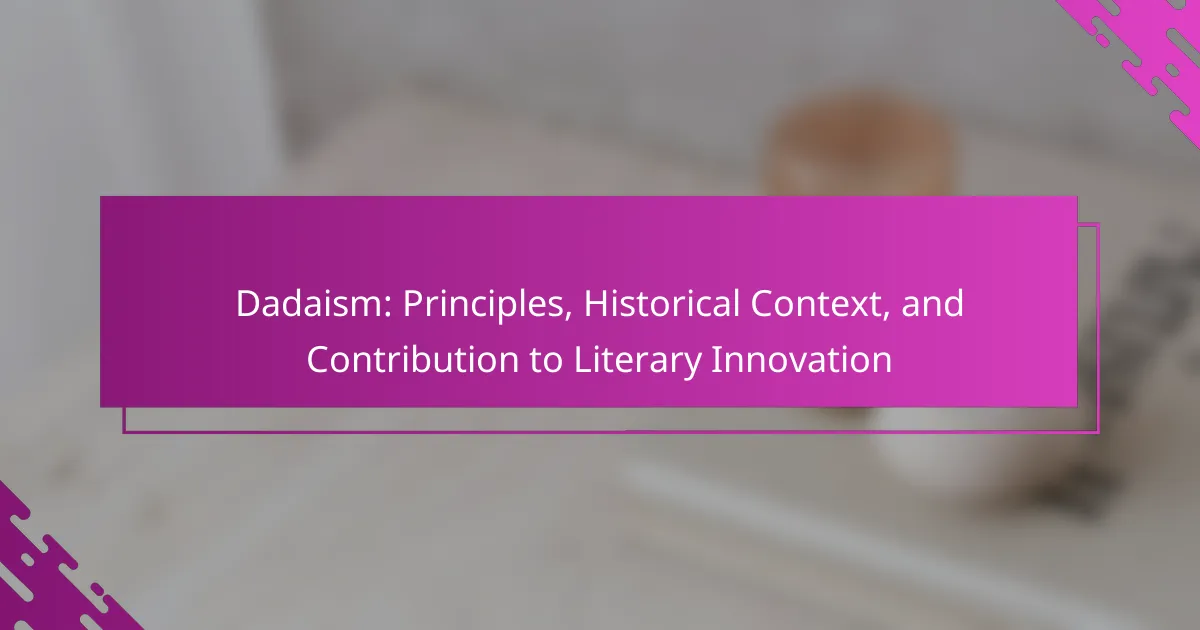Hybrid genres reshape modern literature by blending different storytelling elements, enhancing reader engagement and emotional investment. This article explores notable examples, their influence on literary trends, and strategies for writers to create hybrid narratives. Understanding these genres fosters appreciation for diverse voices and innovative storytelling techniques in contemporary literature.
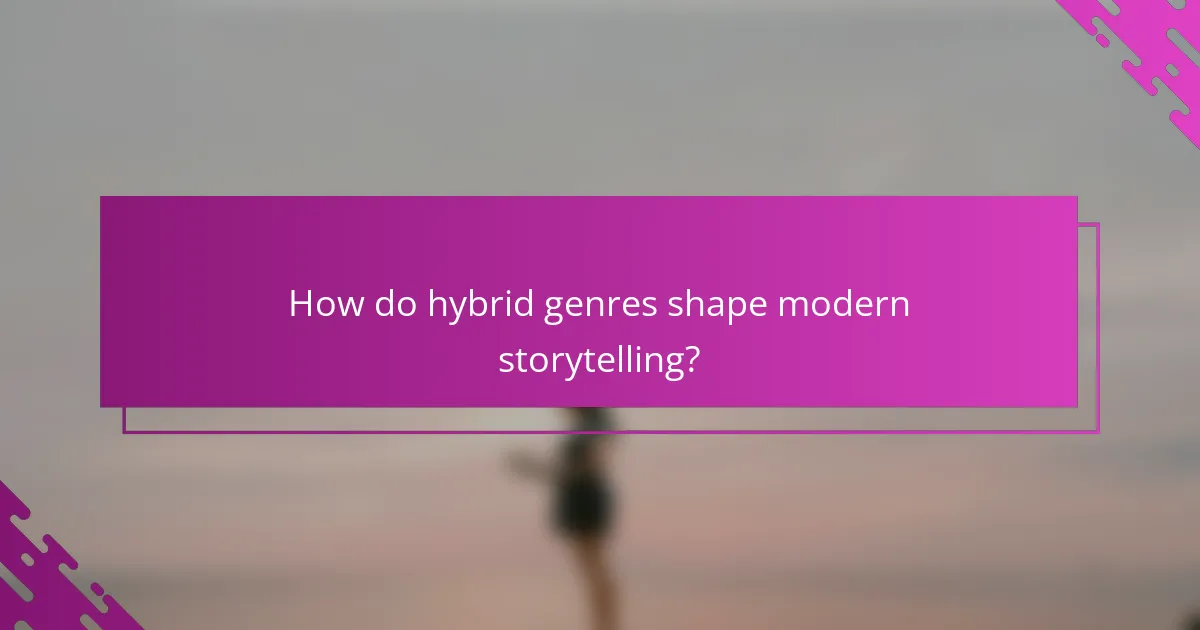
How do hybrid genres shape modern storytelling?
Hybrid genres significantly shape modern storytelling by blending elements from different genres, creating innovative narratives. This fusion allows for richer character development and unique plot structures, engaging diverse audiences. For instance, the combination of science fiction and romance can explore futuristic themes while delving into emotional connections. Such hybridization reflects contemporary society’s complexity, resonating with readers seeking multifaceted experiences. As a result, hybrid genres enhance literary creativity and expand storytelling possibilities.
What are the defining characteristics of hybrid genres?
Hybrid genres combine elements from multiple literary forms, creating unique narratives. They often defy traditional boundaries, allowing for innovative storytelling. Key characteristics include blending styles, thematic diversity, and cross-genre experimentation. For instance, a work may merge science fiction with romance, enriching both genres. This fusion reflects modern literature’s evolution, appealing to diverse audiences and encouraging creative expression.
Why are hybrid genres gaining popularity in contemporary literature?
Hybrid genres are gaining popularity in contemporary literature due to their innovative nature and ability to blend diverse storytelling elements. This fusion attracts readers seeking fresh perspectives and unique narratives. Hybrid genres often challenge traditional boundaries, allowing authors to explore complex themes and varied styles. For instance, works that combine elements of fiction and non-fiction create immersive experiences that resonate with modern audiences. As a result, these genres foster creativity and encourage experimentation, reflecting the evolving landscape of literature.
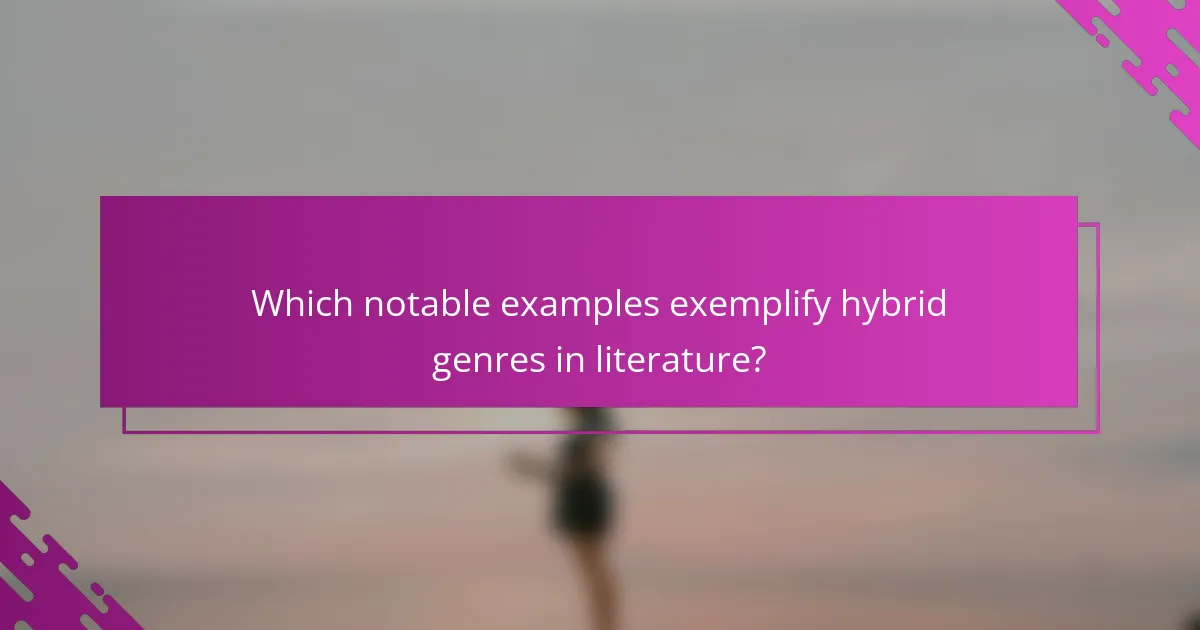
Which notable examples exemplify hybrid genres in literature?
Notable examples of hybrid genres in literature include works that blend elements of fiction and nonfiction, such as “The Brief Wondrous Life of Oscar Wao” by Junot Díaz, which combines magical realism with historical narrative. Another example is “The Sound and the Fury” by William Faulkner, merging stream of consciousness with Southern Gothic. “The House of Leaves” by Mark Z. Danielewski exemplifies a mix of horror and experimental literature through unconventional formatting. Lastly, “Slaughterhouse-Five” by Kurt Vonnegut combines science fiction with anti-war themes, showcasing the versatility and influence of hybrid genres in modern literature.
How do authors blend genres to create unique narratives?
Authors blend genres to create unique narratives by combining elements from different literary styles. This fusion enhances storytelling, allowing for diverse themes and innovative structures.
Hybrid genres, such as magical realism and historical fiction, exemplify this blend. These genres challenge traditional boundaries, offering readers fresh perspectives. They influence modern literature by encouraging experimentation and expanding thematic possibilities.
For example, a novel may intertwine mystery with romance, creating tension and emotional depth. This approach captivates audiences, fostering engagement through unexpected narrative twists.
Ultimately, blending genres enriches literature, promoting creativity and broadening the scope of storytelling.
What role do cultural influences play in hybrid genre development?
Cultural influences significantly shape hybrid genre development by blending diverse literary traditions. These influences foster innovation, creating unique narratives that resonate with varied audiences. For example, the fusion of magical realism and historical fiction illustrates how cultural contexts enrich storytelling. This hybridity reflects global perspectives and enhances literary diversity.
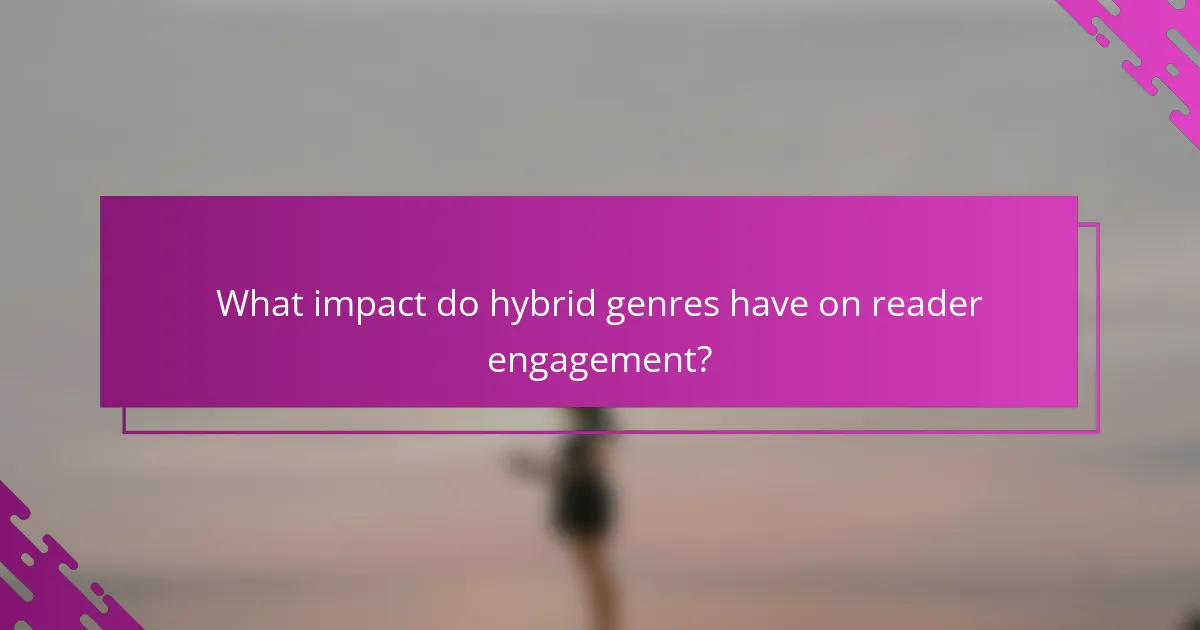
What impact do hybrid genres have on reader engagement?
Hybrid genres significantly enhance reader engagement by blending elements from different literary styles. This fusion creates diverse narratives that appeal to a wider audience. For instance, combining science fiction with romance can attract both genre enthusiasts and general readers. As a result, hybrid genres often lead to increased emotional investment and curiosity, making stories more compelling. Unique attributes like unpredictable plot twists and multifaceted characters further contribute to reader retention and satisfaction.
How do hybrid genres attract diverse audiences?
Hybrid genres attract diverse audiences by blending elements from different literary styles, appealing to varied tastes and preferences. This fusion creates unique narratives that resonate with a wider range of readers. For example, the combination of fantasy and mystery can draw in fans of both genres, enhancing engagement. Additionally, hybrid genres often explore complex themes and characters, fostering deeper emotional connections. This versatility allows writers to experiment and innovate, further expanding their reach. As a result, hybrid genres play a significant role in modern literature’s evolution and popularity.
What are the challenges faced by authors of hybrid genres?
Authors of hybrid genres face challenges such as audience expectations, marketing difficulties, and genre classification issues. Balancing elements from multiple genres can confuse readers about the work’s identity. Hybrid authors often struggle to find their niche in a market that favors clearly defined categories. Additionally, they may encounter resistance from traditional publishers who prefer conventional genre structures. These challenges can hinder visibility and acceptance in the literary community.
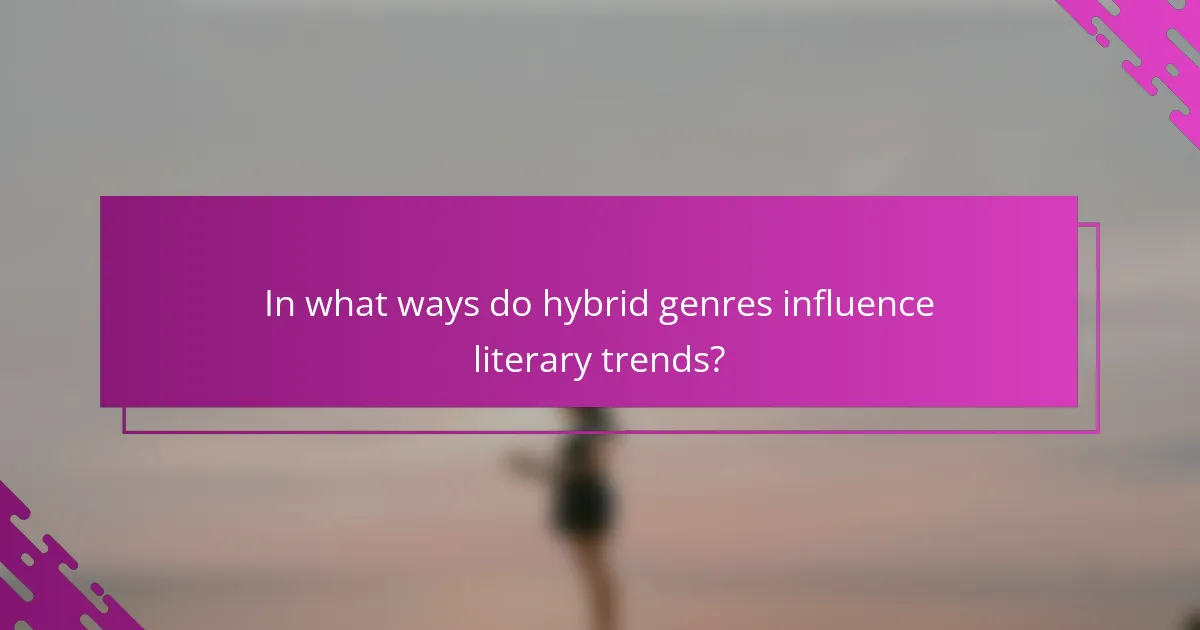
In what ways do hybrid genres influence literary trends?
Hybrid genres influence literary trends by blending elements from various genres, creating innovative narratives that attract diverse audiences. This fusion encourages experimentation, leading to fresh storytelling techniques and themes. For instance, the combination of science fiction and romance often explores human relationships in futuristic settings, reflecting contemporary societal issues. Additionally, hybrid genres challenge traditional genre boundaries, resulting in a more inclusive literary landscape that embraces unique voices and perspectives. As a result, readers experience richer, more complex narratives that resonate with a wider array of experiences and emotions.
How have hybrid genres changed the publishing landscape?
Hybrid genres have significantly transformed the publishing landscape by blending elements from multiple genres, appealing to diverse reader preferences. This evolution has led to innovative storytelling techniques and expanded creative boundaries for authors.
Examples include the rise of literary fiction combined with fantasy, creating immersive worlds that challenge traditional narratives. As a result, hybrid genres attract broader audiences and encourage cross-genre experimentation. This shift influences publishing trends, with more publishers seeking unique works that defy conventional categories.
The unique attribute of hybrid genres is their ability to reflect contemporary societal themes, resonating with readers seeking relatable and multifaceted stories. Rarely, some hybrid works incorporate multimedia elements, enhancing reader engagement and interaction. Overall, the impact of hybrid genres on modern literature is profound, fostering a dynamic and inclusive literary environment.
Which hybrid genres are emerging as influential in 2025?
Emerging hybrid genres in 2025 include speculative fiction, which blends science fiction with social commentary, and literary thrillers that incorporate elements of mystery and psychological depth. These genres reflect evolving reader preferences for complex narratives. Notably, the rise of cli-fi combines environmental themes with speculative storytelling, addressing climate change concerns. Additionally, the fusion of romance with fantasy elements continues to captivate audiences, showcasing diverse character arcs and imaginative worlds. These trends highlight the dynamic nature of modern literature and its ability to adapt to societal changes.
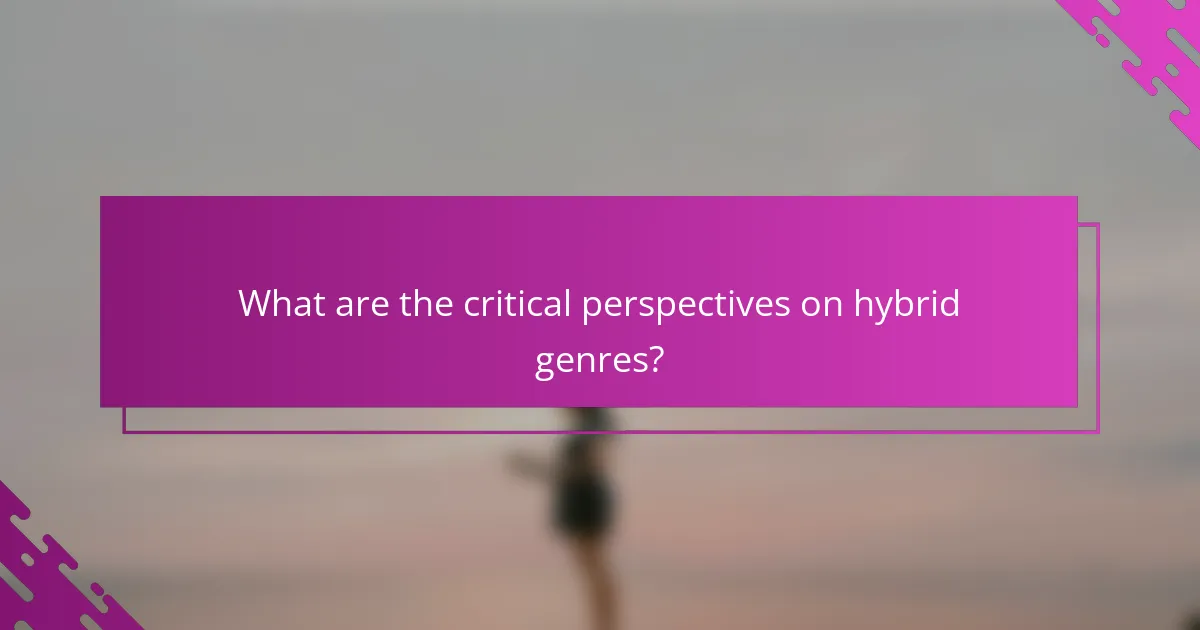
What are the critical perspectives on hybrid genres?
Critical perspectives on hybrid genres highlight their complexity and innovation in modern literature. Critics argue that hybrid genres challenge traditional boundaries, fostering creativity and diverse narratives. They emphasize the importance of blending styles to reflect contemporary experiences. Additionally, hybrid genres can provoke debates on authenticity and genre conventions, prompting readers to reconsider their expectations.
How do literary critics evaluate hybrid works?
Literary critics evaluate hybrid works by analyzing their blending of genres and the resulting narrative techniques. They assess how these combinations challenge traditional forms and engage readers in new ways. Critics often focus on the unique attributes that arise from this experimentation, such as innovative storytelling methods or thematic depth. Examples include works that merge poetry with prose, creating a distinct voice that reflects contemporary issues. The influence of hybrid genres is significant, as they expand the boundaries of literature and encourage diverse interpretations.
What are common misconceptions about hybrid genres?
Common misconceptions about hybrid genres include the belief that they lack depth or originality. Many think hybrid genres dilute the characteristics of their parent genres, but they often create innovative narratives. Another misconception is that hybrid genres cater only to niche audiences; in reality, they can appeal to a broad readership. Some readers assume hybrid genres are merely experimental, overlooking their ability to address complex themes and emotions. Lastly, there’s a belief that hybrid genres are a recent trend, while they have existed throughout literary history, evolving with cultural shifts.
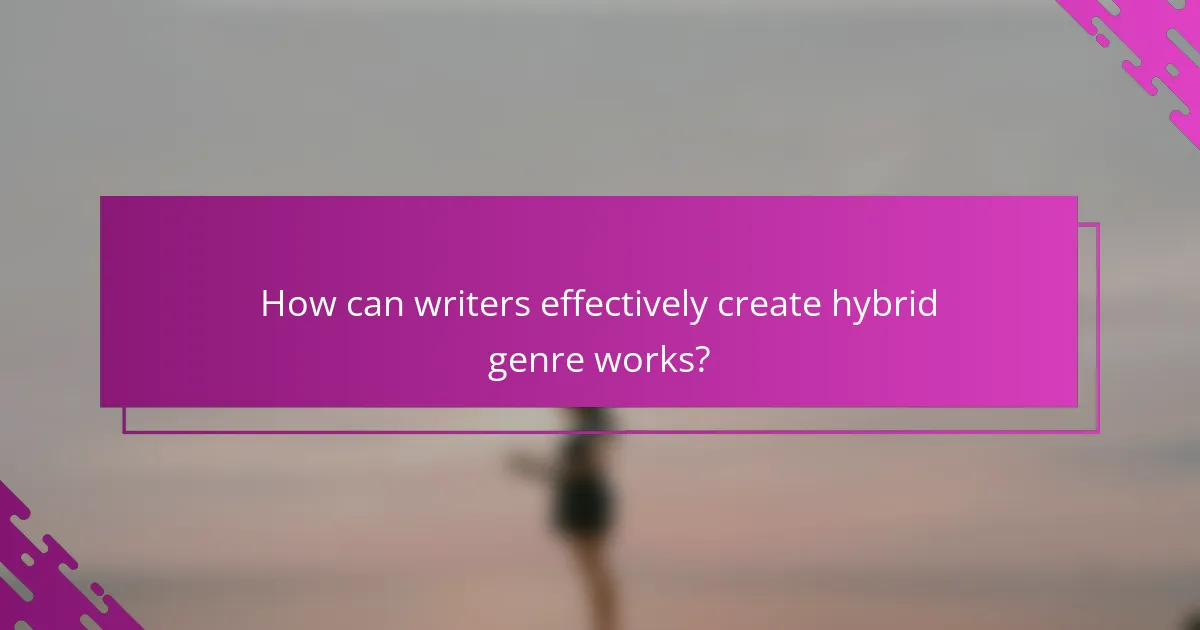
How can writers effectively create hybrid genre works?
Writers can effectively create hybrid genre works by blending elements from different genres to craft unique narratives. This approach allows for greater creative freedom and can engage diverse audiences.
To achieve this, consider the following strategies:
1. Identify core elements of each genre you wish to combine.
2. Experiment with narrative structures that incorporate aspects from both genres.
3. Develop characters that embody traits typical of each genre.
4. Use thematic elements that resonate across genres, enhancing emotional depth.
By thoughtfully merging these components, writers can produce innovative works that challenge conventional genre boundaries.
What strategies can authors employ to blend genres successfully?
Authors can blend genres successfully by embracing innovation, experimenting with narrative styles, and integrating diverse themes. They should identify commonalities between genres, allowing for seamless transitions. Additionally, studying successful hybrid works can provide insights into effective techniques. Collaboration with other writers can also inspire unique combinations and fresh ideas.
What common pitfalls should writers avoid when exploring hybrid genres?
Writers exploring hybrid genres should avoid blending too many styles, which can confuse readers. They should also steer clear of neglecting genre conventions, as this can lead to a lack of coherence. Failing to define a clear narrative voice may result in an inconsistent tone. Lastly, overcomplicating plots with excessive elements can detract from the story’s impact.
What resources are available for aspiring hybrid genre authors?
Aspiring hybrid genre authors can access various resources, including writing workshops, online courses, and genre-specific communities. These platforms offer guidance on blending genres effectively. Notable resources include the Association of Writers & Writing Programs (AWP), which hosts conferences and panels focused on hybrid genres. Additionally, websites like Writer’s Digest provide articles and prompts tailored to hybrid writing. Engaging with critique groups can also enhance skills through feedback on unique narrative styles.
